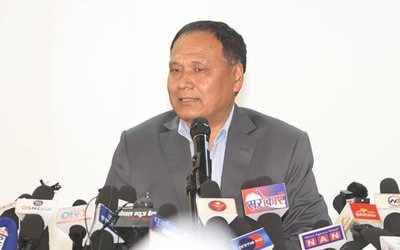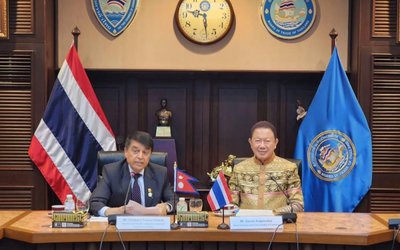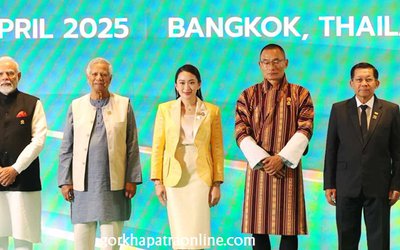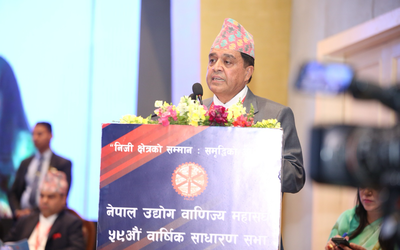
Experts from various South Asian countries underlined the need for regional cooperation to expedite trade, address climate change concerns and overcome food insecurity.
Speaking at a two-day seminar on Regional cooperation on trade, climate change and food security in South Asia: Some reflections and way forwardorganized by South Asia Watch on Trade, Economics and Environment (SAWTEE) in the capital on Thursday, speakers and participants stressed that all South Asian countries should work in tandem to increase intra-regional trade, and fight widespread poverty that has been a perennial problem for all South Asian nations.
Addressing the inaugural session of the seminar, Shanker Das Bairagi, Officiating Secretary, Ministry of Foreign Affairs, Government of Nepal, highlighted the need to promote more investment in agriculture to address food insecurity. He also stressed that SAFTA should expedite work to address non-tariff barriers (NTBs) for significant progress has already been made in reducing tariffs and eliminating quantitatives restrictions. Bairagi urged the particpants to provide informed inputs to strengthen regional cooperation in South Asia, which will be taken by the 18th SAARC Summit to be held in Kathmandu in November.
Dr. Dinesh Bhattarai, Advisor to the Prime Minister, reiterated that increasing intra-regional trade is essential to accelerate economic growth in South Asia. He highlighted that given South Asia's vulnerability to climate change impacts, well coordinated efforts at national, regional and global levels are necessary. He stressed on the need to make agriculture employment decent in the region. Additionally, Dr. Bhattarai pointed out that inclusive collaboration between governments, private sector and relevant stakeholders is key to effectively address trade, climate change and food security concerns in the region.
As the Chair of the session, Dr. Posh Raj Pandey, Executive Chairman, SAWTEE, appreciated the positive developments that have taken place in South Asia over the past few years, mainly in terms of increasing economic growth and reducing poverty. However, true potential of regional cooperation is yet to be realized. Also, making a presentation on the Ninth WTO Ministerial Decision on Food Security, he argued that public stockholding of food for food security purpose might not be helpful to stabilize prices as envisaged, and therefore, called for regional cooperation by prohibiting export bans, coordinating price and trade policies, enhancing cooperation in the area of agricultural research, and increasing investment in agriculture, among others.
Puspa Sharma, Research Director, SAWTEE stressed the need to prioritize food security, while highlighting that non-operationalization of the SAARC Food Bank is a testemant to the region's lack of concern over growing food insecurity.
In the subsequent session, Dr. Ratnakar Adhakari, Executive Director, Enhanced Integrated Framework (EIF) Secretariat, Geneva, talked on the role of Aid for Trade (AfT) and EIF in providing assistance and support to least-developed countries, including in South Asia, for the implementation of trade facilitation measures and commitments under the Trade Facilition Agreement of the WTO. He highlighted that at present, nearly 82 percent of total AfT funding for trade facilitation in South Asia is concentrated in Afghanistan, and therefore, there is a need to increase and diversify the funding to other South Asian countries.
In one of the sessions, participants also dwelled upon the issue of non-operationalization of the SAARC Food Bank, and viewed that the mechanism, as it exists, is more beneficial for the smaller economies of the region. However, even to make it work for them, there is need to make changes in some of the operational procedures.
Another highlight of today's discussion was a focus on the importance of develping a regional transit agreement in South Asia to benefit from intra-regional trade.
About 50 participants, including 25 from other South Asian countries, representing governments, civil society, private sector, academia and the media are participating in the seminar.
- NEPAL-THAILAND: Joint Business Council
- Apr 13, 2025
- BIMSTEC SUMMIT: Nepal’s Stand
- Apr 11, 2025
- IME GROUP: Expands Into Paper Industry
- Mar 24, 2025
- CPN UML: Instigated By India
- Mar 23, 2025
- ADB’S CHIEF ECONOMIST: Nepal Reduces Poverty
- Mar 11, 2025















